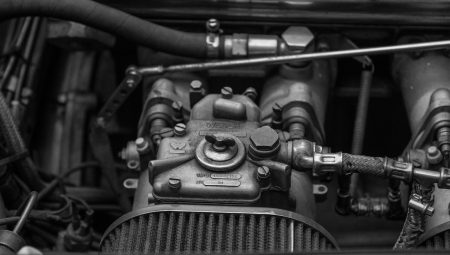The 2002 Honda Civic engine mount is more than just a simple component; it’s the backbone of your vehicle’s stability. This crucial part not only secures the engine to the frame but also absorbs vibrations, providing a smooth driving experience. Think of it as a shock absorber for your engine—without it, every bump in the road would translate to a jarring ride. If you’re experiencing vibrations or unusual noises, it might be time to give your engine mount some attention.
Engine mounts are essential for maintaining the performance and longevity of your vehicle. They are designed to minimize the transfer of vibrations from the engine to the chassis, ensuring that you enjoy a comfortable ride. When these mounts wear out, they can lead to a host of problems that affect not just comfort but also safety. Regular inspections can help you catch issues before they escalate into costly repairs.
Recognizing the symptoms of a failing engine mount is key to keeping your Civic in top shape. Common signs include:
- Excessive vibration in the cabin.
- Unusual noises like clunking when accelerating or decelerating.
- Misalignment of the engine, which can affect handling.
If you notice any of these symptoms, don’t ignore them; they could indicate that your engine mount needs immediate attention.
Replacing a worn engine mount is crucial for maintaining vehicle safety and performance. If you’re a DIY enthusiast, knowing the right tools and steps can make the process much easier. However, if you’re unsure, seeking professional help is always a wise choice. A poorly installed engine mount can lead to further complications down the line.
When it comes to replacing your engine mount, selecting the right part is essential. You have two main options: OEM (Original Equipment Manufacturer) and aftermarket parts. While OEM parts offer guaranteed compatibility, aftermarket options may provide cost savings. Make sure to weigh your options carefully to ensure you choose a mount that offers both quality and longevity.
The price of engine mounts can vary significantly based on the brand and type. Knowing what to expect can help you budget effectively for this necessary maintenance task. On average, you might find prices ranging from $50 to $150 for a quality engine mount. Remember, investing in a good mount can save you money in the long run by preventing more serious issues.
Understanding Engine Mounts
Engine mounts are essential components in your vehicle, specifically designed to secure the engine to the frame. Think of them as the shock absorbers for your engine, absorbing vibrations and impacts to provide a smooth driving experience. Without these mounts, your engine would be vulnerable to damage, and your ride would be anything but comfortable.
These mounts are typically made from a combination of rubber and metal, which allows them to handle the stress of engine movement while minimizing noise and vibration. The primary functions of engine mounts include:
- Stabilizing the engine: Keeps the engine in place during operation.
- Reducing vibrations: Absorbs shocks from the engine’s movement.
- Protecting the engine: Prevents damage from misalignment or excessive movement.
Understanding the role of engine mounts not only helps you appreciate their importance but also prepares you to recognize when they might need replacing. Regular inspections can save you from costly repairs down the road!
Symptoms of a Failing Engine Mount
Recognizing the signs of a failing engine mount is vital for maintaining your vehicle’s performance. If you notice excessive vibration while driving, it’s a clear indication that something might be off. This sensation can feel like your car is shaking, making your ride uncomfortable. Additionally, keep an ear out for unusual noises; clunking or banging sounds during acceleration or deceleration can signal engine mount issues. Addressing these symptoms early can prevent further damage and ensure a smoother driving experience.
Here are some common symptoms to watch for:
- Excessive Vibration: A noticeable shake in the cabin can indicate a problem.
- Unusual Noises: Listen for clunking sounds when the engine shifts.
- Misalignment: If your engine appears crooked, it’s time for a check-up.
Ignoring these signs can lead to more serious issues down the road, so it’s crucial to stay vigilant. Remember, a healthy engine mount contributes to a smooth and safe driving experience.
Excessive Vibration
Experiencing in your 2002 Honda Civic? It’s not just an annoying quirk; it’s a red flag waving at you! This unsettling sensation can be felt in the cabin, making your ride feel like a bumpy roller coaster. Imagine trying to enjoy a smooth drive, only to be jolted around—frustrating, right? The root cause is often a worn-out engine mount, which is designed to absorb vibrations. When it fails, it can lead to serious discomfort and even impact your vehicle’s handling.
Here are some common causes of vibration:
- Worn rubber components
- Misalignment of the engine
Ignoring these vibrations can escalate into bigger problems, affecting not just your comfort but also the overall driving experience. So, if your Civic starts to shake like it’s dancing to a bad tune, it’s time to take action!
Causes of Vibration
Vibration in your 2002 Honda Civic can be a real nuisance, and understanding its causes is the first step toward a smoother ride. One of the primary culprits is worn rubber components in the engine mount. Over time, these parts can degrade due to exposure to heat and engine fluids, leading to less effective vibration absorption. Additionally, misalignment of the engine can also contribute significantly to vibration issues. When the engine isn’t properly aligned, it can create an uneven distribution of weight and force, resulting in excessive shaking felt throughout the vehicle.
Moreover, factors such as road conditions and driving habits can exacerbate these vibrations. For instance, hitting potholes or driving on rough terrain can put additional stress on the engine mounts. If you notice vibrations that seem to worsen over time, it’s crucial to get them checked out. Ignoring these signs could lead to more serious issues down the line, affecting not just comfort but also the overall performance and safety of your vehicle.
Impact on Driving Experience
Excessive vibration from a failing engine mount can significantly alter your driving experience. Imagine cruising down the highway, and suddenly, your car feels like it’s shaking apart—definitely not the smooth ride you signed up for! This discomfort isn’t just annoying; it can lead to reduced handling and increased wear on other components. When the engine isn’t securely mounted, it can shift under acceleration or braking, causing a lack of control that can be dangerous.
Moreover, the vibrations can create a ripple effect throughout the vehicle, affecting everything from the steering to the suspension. You might even notice:
- Difficulty in steering due to misalignment.
- Increased road noise that drowns out your favorite tunes.
- Uneven tire wear that could lead to costly replacements.
In essence, neglecting a failing engine mount isn’t just a minor oversight; it’s a recipe for a frustrating and potentially hazardous driving experience. So, if you’re feeling those vibrations, it’s time to take action!
Unusual Noises
Have you ever noticed unusual clunking or banging noises when you accelerate or decelerate your 2002 Honda Civic? If so, it’s time to pay attention! These sounds can be a telltale sign of a failing engine mount. Just imagine driving down the road, and every bump feels like a mini earthquake inside your car—definitely not a pleasant experience!
These noises often arise due to the engine mount’s inability to properly secure the engine, leading to movement that creates those unsettling sounds. It’s crucial to identify these noises early on; otherwise, you risk further damage to your vehicle. Here are some common scenarios where you might hear these noises:
- During acceleration: A loud thud can indicate that the engine is shifting more than it should.
- While turning: You might hear a clunking sound when cornering, suggesting that the engine mount is failing to hold the engine steady.
- When hitting bumps: A banging noise when you drive over potholes can also signal trouble.
Ignoring these signs can lead to more significant issues, so if you hear any of these noises, consider getting your engine mount checked. Trust me, your Civic will thank you for it!
Replacing the Engine Mount
Replacing a worn engine mount is not just a task; it’s a vital part of ensuring your 2002 Honda Civic runs smoothly. Think of the engine mount as the unsung hero of your vehicle—it keeps everything in place while absorbing the harsh vibrations that come from the engine. If you notice any signs of wear, addressing this issue promptly can save you from more significant problems down the road.
Before diving into the replacement process, gather the necessary tools. You’ll need a jack, jack stands, wrenches, and possibly a torque wrench. Here’s a quick overview of the steps involved:
- Raise the vehicle securely using a jack.
- Locate the engine mount, usually found near the engine block.
- Remove the bolts securing the old mount.
- Install the new mount and tighten the bolts to the manufacturer’s specifications.
While DIY replacement can be rewarding, don’t hesitate to consult a professional if you’re unsure. Proper installation is crucial for safety and performance. Remember, a well-functioning engine mount not only enhances your driving experience but also prolongs the life of your vehicle.
DIY Replacement Tips
Are you ready to tackle the engine mount replacement on your 2002 Honda Civic? It’s not as daunting as it sounds! First, gather the necessary tools: a socket set, a jack, and jack stands. Start by safely lifting the vehicle and securing it. Remember, safety first!
Next, locate the engine mount, which is usually found at the front or rear of the engine. Remove any bolts connecting the mount to the engine and the frame. Take your time here; rushing can lead to mistakes. Once the old mount is out, compare it with the new one to ensure proper fit.
Now, it’s time to install the new mount. Align it carefully and tighten the bolts securely. Don’t forget to double-check your work! After you’ve finished, lower the car and take it for a test drive. Feel that smooth ride? That’s the sweet reward of your DIY effort!
Here’s a quick reminder of the steps:
- Gather tools: socket set, jack, jack stands
- Lift and secure the vehicle
- Remove old engine mount
- Install new engine mount
- Test drive your Civic!
With a bit of patience and care, you can save money and gain confidence in your mechanical skills. Happy wrenching!
When to Seek Professional Help
Sometimes, tackling engine mount issues on your own can feel like trying to solve a Rubik’s Cube blindfolded. If you notice persistent symptoms like excessive vibration or unusual noises, it might be time to call in the pros. Don’t underestimate the importance of proper installation! A poorly installed engine mount can lead to further complications, costing you more down the road.
Here are a few signs that indicate it’s best to seek professional help:
- Persistent Symptoms: If the vibrations and noises continue despite your attempts at a fix, it’s a red flag.
- Complex Repairs: If the task involves more than just the engine mount, such as addressing misalignment or other components, a mechanic’s expertise is invaluable.
- Lack of Tools: Not having the right tools can turn a simple job into a disaster. Don’t risk it!
In these instances, consulting a mechanic not only ensures safety but also provides peace of mind.
Choosing the Right Replacement Part
When it comes to replacing the engine mount in your 2002 Honda Civic, choosing the right part is essential for ensuring optimal performance and longevity. You have two main options: OEM (Original Equipment Manufacturer) parts and aftermarket alternatives. While OEM parts guarantee a perfect fit and quality, aftermarket options can be more budget-friendly. However, not all aftermarket parts are created equal, so it’s crucial to do your research.
Consider the following factors when selecting a replacement engine mount:
- Material: Look for durable materials that can withstand engine vibrations.
- Manufacturer Reputation: Opt for brands known for quality and reliability.
- Warranty: A good warranty can provide peace of mind about your purchase.
Additionally, comparing prices can help you find the best deal. Here’s a quick table to give you an idea of what to expect:
| Part Type | Price Range |
|---|---|
| OEM Engine Mount | $150 – $300 |
| Aftermarket Engine Mount | $80 – $200 |
Ultimately, the right choice depends on your budget, needs, and how long you plan to keep your vehicle. Making an informed decision now can save you from headaches down the road!
OEM vs. Aftermarket Options
When it comes to replacing your 2002 Honda Civic’s engine mount, you have two primary choices: OEM (Original Equipment Manufacturer) parts and aftermarket options. Each has its pros and cons, making it essential to understand what fits your needs best.
OEM parts are made by the same manufacturer that produced the original components of your vehicle. This means they are designed to meet the exact specifications of your car, ensuring a perfect fit and reliable performance. However, they often come with a higher price tag.
On the other hand, aftermarket parts are produced by third-party companies. They can be more affordable, but quality can vary significantly. Some aftermarket options may even exceed OEM standards, while others might fall short. It’s crucial to research the manufacturer’s reputation and read reviews before making a choice.
Here’s a quick comparison:
| Feature | OEM | Aftermarket |
|---|---|---|
| Fit | Perfect fit | Varies |
| Price | Higher | Generally lower |
| Quality | Consistent | Varies widely |
| Warranty | Often includes warranty | Depends on the manufacturer |
Ultimately, the decision between OEM and aftermarket engine mounts should be based on your budget, performance expectations, and how long you plan to keep your vehicle. Remember, investing in a quality engine mount can save you from costly repairs down the road!
Price Considerations
When it comes to replacing the engine mount of your 2002 Honda Civic, understanding the price range is crucial. Prices can vary significantly based on factors like the type of mount, whether you choose an OEM or aftermarket part, and where you purchase it. Typically, you can expect to pay anywhere from $50 to $200 for a single engine mount. Below is a breakdown of what to consider:
| Type | Price Range |
|---|---|
| OEM Parts | $100 – $200 |
| Aftermarket Parts | $50 – $150 |
While OEM parts usually offer better quality and compatibility, aftermarket options can be more budget-friendly. However, always ensure you check reviews and warranties before making a purchase. Remember, investing in a quality engine mount can save you from costly repairs down the road. So, when budgeting for this maintenance task, factor in not just the price but also the long-term benefits of your choice.





